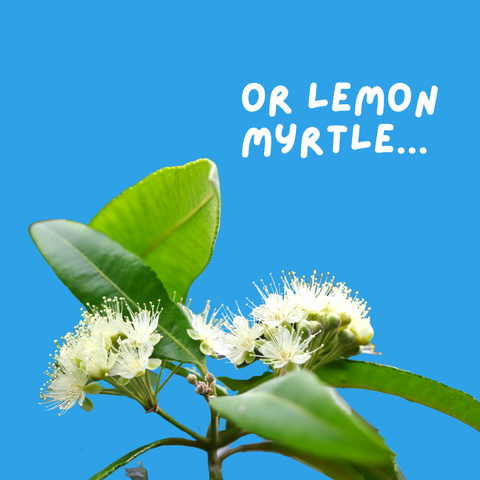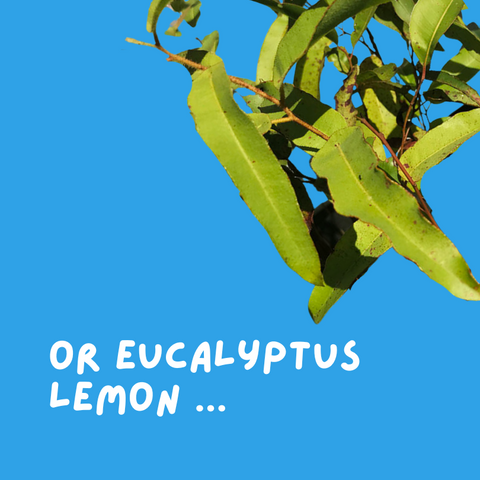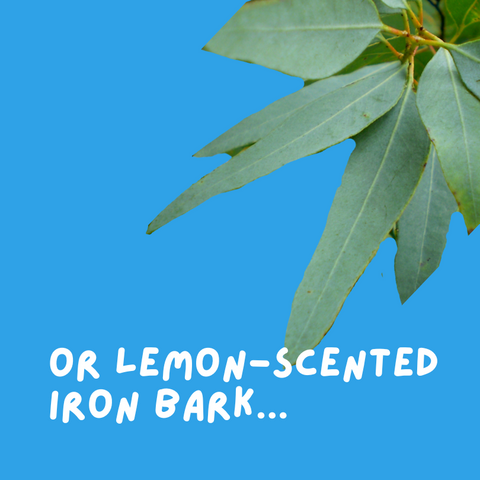Lemon is without a doubt the essence of clean – nothing else erases the smelliest of smells quite like it. Lemon is the classic hero of disinfecting wipes, laundry powder, candles, body care, hand soaps, cleaning sprays, deodorants, room mists and so much more.
Although there are countless benefits to lemon essential oil, like its skin-supporting chemical compound and revitalizing aroma profile, we’ve gathered up our favorite species that offer a similar citrus scent, but unique stories and additional benefits from the rich biodiversity of Australia.
Lemon Oil Alternatives Safe for Skin
While using lemon directly on your skin may not be the best idea, some lemon-based ingredients contain compounds that are valued in skincare, like Ascorbic Acid (natural Vitamin C), which helps with photo-aging and collagen production, or Alpha-Hydroxy Acids, a chemical exfoliant that can help reduce acne, or Niacin, an anti-inflammatory for pigmentation or dry skin. However, these ingredients may also include lemon’s phototoxic chemicals that come from the fruit’s peels, which can cause burns, blisters or just irritation in general.
These following essential oils are great replacements for lemon oil, each offering something unique of their own…

BENEFITS of LEMON-SCENTED ESSENTIAL OILS:
 1. Australian Lemon Myrtle Oil Backhousia citriodora (also available in hydrosol format for gentler topical applications)
1. Australian Lemon Myrtle Oil Backhousia citriodora (also available in hydrosol format for gentler topical applications)
- With the highest citral content of any tree, Lemon Myrtle has been said to smell and taste “lemonier than lemon”!
- Great in food dishes, it offers even more topical benefits with natural antibacterial, antimicrobial and antifungal properties for endless skincare applications
- Its properties include citral, citronellal and linalool, which is used as a scent in the majority of perfumed personal care and cleaning products.
- Citral is also an antioxidant and has shown anti-inflammatory effects.
 2. Eucalyptus Lemon Oil Eucalyptus citriodora
2. Eucalyptus Lemon Oil Eucalyptus citriodora
- Lemon Eucalyptus (or Eucalyptus Lemon) Oil has a refreshing, air-cleansing sensation that inhaled is great for folks with asthma, colds or coughs, and Respiratory infections.
- Great natural insect repellent for mosquitoes, ticks, fleas and others pests.
- Analgesic, anti-fungal and anti-inflammatory properties.
- Indigenous Aboriginal people would use this plant’s leaves to ease joint pain and speed up the healing of cuts, skin conditions, wounds and infections.
 3. Lemon-Scented Tea Tree Oil Leptospermum petersonii
3. Lemon-Scented Tea Tree Oil Leptospermum petersonii
- Carrying all the great benefits with it from the regular Tea Tree Oil, it also has anti-bacterial properties but a clean and more refreshing aroma.
- Its properties include geranial 20-30%, neral 22-35% and citronellal 10-35%
- As an antiseptic, it can be used on insect bites, cuts, burns, acne, wounds, bruises, and sunburns.
 4. Eucalyptus Lemon Scented Iron Bark Essential Oil Eucalyptus staigeriana
4. Eucalyptus Lemon Scented Iron Bark Essential Oil Eucalyptus staigeriana
- It has a sweet and fruity lemon aroma with rosemary-ish under tones.
- Its main compounds, methyl geranate, geranyl acetate and beta-phellandrene, are all non-toxic, non-irritant.
- Eucalyptus Lemon-Scented Ironbark doesn’t have as harsh of an aroma profile as either Lemon Myrtle or Lemon Tea Tree, and is a much milder ingredient, great for topical formulations.
5. Australian-Grown Lemongrass Cymbopogon flexuosus
- Main Constituents: Citral (<80%), Geraniol (<7%), Limonene (<4%).
- This revitalising oil is often used in balms or in carrier oils to ease muscular aches and pains.
- With its antifungal and anti-inflammatory properties and being cleansing and nourishing, it is a common ingredient in skin care and body care products aimed at problem and sensitive skin.
- Lemongrass oil is often also used for its clean fragrance component in deodorants, soaps and detergents.

Are you trying to make your scents stand out?
Contact our team of ingredient experts to learn more about the latest in essential oils for naturally scented formulations!
APPLICATIONS FOR LEMON-SCENTED ESSENTIAL OILS:
Personal Care
o Body sprays or roller perfumes
o Stress-reducing and calming applications
o Deoderant
o Perfume
o Cleansers
o Herbal Bubble Baths
o Massage oils
o Botanical butters
o Sugar Scrubs
o Etc.
Home
o Blends for burners, humidifiers, candles, soaps
o Air Fresheners
o Linen Mists
o Diffuser Oils
o All Purpose Cleaning Sprays
o Etc.
BEST OILS TO BLEND LEMON SCENT WITH:
o Basil
o Cedarwood
o Eucalyptus
o Geranium
o Grapefruit
o Lavender
o Peppermint
o Rosemary
o Sage
o Tangerine
o Tea Tree
o Thyme
Looking for the NEXT fresh hero ingredient for your natural NPD?
Our ingredient experts are an email/call away to introduce you to trending, world-first species and alternative formats…Sales@napproducts.com
SAFETY FIRST
Essentials oils can be 50-100x more concentrated than natural levels in the plant. Take caution and always mind best practices when using oils. If applying topically, they should be diluted into a carrier oil and ONLY IF they are recommended for ingestion or inhalation, be sure to follow recommended dosage.
EXTERNAL RECOMMENDATIONS
Essential oil: Several drops rubbed into the skin. (This may be diluted at 30 ml essential oil to 500 ml of a suitable carrier such as vegetable oil.)
Ointment: Semi-solid preparation containing 5-20% essential oil (in carrier oils, creams, or lotions) for local application. (Salve)
Tincture: Aqueous-alcoholic preparation containing 5-10% essential oil for local application.


